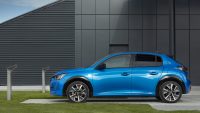Fewer new car buyers are considering switching to an electric vehicle because of the rising cost of living and high prices.
What Car? research of buyers’ intentions between January 2022 and April 2023 found the proportion of people seeking an EV as their next new factory order had sunk from 30 per cent to 22 per cent.
The figures come from two surveys carried out in the January – of 1,403 and 1,264 people – and one in the April, which saw 1,036 people quizzed.
Asked by the new car buying platform how the current economic climate was affecting their vehicle purchase, 43.3 per cent of 1,009 survey respondents said it was impacting on them negatively.
That has seen them spending less, choosing a different make or model or delaying their purchase. Just 4.1 per cent said there had been a positive impact.
Almost nine-tenths (88.2 per cent) weren’t in the market for an electric car, but 21.6 per cent had considered one before deciding against it.
Of those buyers, 55.2 per cent said they’d decided an electric car was too expensive for them, while a third cited the vehicles not offering a long enough range, and 29.7 per cent blamed poor access to home or work charging.
What Car?’s Target Price mystery shopper data found some manufacturers were now heavily discounting electric vehicles, with up to 14 per cent (£4,105) cash savings on certain models to help drive demand.
The average cash and finance saving on a new electric car is £2,147.
What Car? editor Steve Huntingford said: ‘Electric cars continue to command a significant price premium over their petrol and diesel counterparts.
‘Our Target Price data reveals a new petrol car costs £43,694 on average compared with £61,517 for a new EV.
‘With the cost of living on the rise, it’s no surprise to see a declining share of buyers considering an electric vehicle as their next car.
‘However, the good news is that manufacturers are now starting to offer some great EV discounts to help buyers.’



































